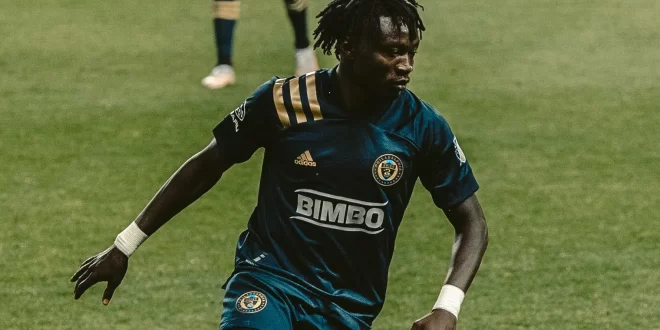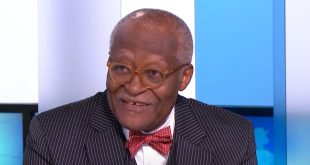Philadelphia Inquirer | Mbaizo’s wife has sought U.S. visas for herself and the couple’s son for years, and always been rejected. The Union don’t want to lose an important player, but can’t change federal immigration laws.
Union right back Olivier Mbaizo’s long-running frustration with his family’s inability to get U.S. visas escalated Tuesday.
A source confirmed a report from the Athletic that Mbaizo has asked the Union to find a deal that gets him to another country, so that his wife and son can be with him instead of stuck in their native Cameroon. They’ve applied for visas multiple times in the 25-year-old’s five years here, and always been rejected.
This was music to the ears of teams abroad that have been quietly pursuing Mbaizo for a while, and now will get louder. They know that last fall, he became the first active Union player to make a World Cup team, even though he didn’t see the field in Qatar.
Sporting director Ernst Tanner’s phone likely lit up after the news broke, with inquiries hoping to leverage Mbaizo’s discontent into a discounted transfer fee.
The Union have been planing for a while to cash in on Mbaizo’s success, with Nathan Harriel growing into his role as a platoon-level right back. In fact, it would have come as no surprise had the Union sold Mbaizo during the winter.
Right now, though, Harriel is the only other right back on the roster. So the Union will presumably try to keep Mbaizo happy through the end of this season, then see what can be done.
Last fall, Olivier Mbaizo (left) became the first active Union player to make a World Cup team when he earned a place on Cameroon’s squad in Qatar.Read moreStuart Franklin / Getty Images
Unfortunately, an answer that keeps Mbaizo here for the long term is likely out of the Union’s hands. His family’s inability to get visas is up to the federal government’s immigration policies. And Mbaizo is far from alone in being stuck.
The issue came up prominently in the last few days in the National Women’s Soccer League, with two players who will play in the upcoming World Cup. Racing Louisville and Nigeria forward Uchenna Kanu told the Athletic that her family has been denied U.S. entry visas for years, going back to when she graduated from Florida’s Southeastern University in 2019.
“I’ve had my teammates, their family come over and watch them, and sometimes I’m sad about that,” Kanu said. “There’s nothing I can do because I’ve tried a couple of times to invite them over and to visit [the United States], but sometimes they get denied visas.
Especially when I was graduating college, I sent a letter to my mom and the Embassy of the United States to grant my mom a visa to come to my graduation and she got denied as well.”
Professional athletes from different countries have had issues bringing family members into the country because of visa denials.
Louisville and Brazil forward Ary Borges told the Athletic it’s been “a little cumbersome” to get her family into the U.S. And the difference in the players’ words isn’t just rhetorical – there are differences in how their countries get treated, here and elsewhere.
The citizenship advisory firm Henley & Partners tracks data for a global ranking of how much access each country’s passport grants its citizens. Cameroon has a score of 50, while the United States has a score of 185. Nigeria’s is 45 and Brazil’s is 169.
Keep that in mind as the Union try to find a solution that works for all sides involved.
 CameroonOnline.org Cameroon news, Actualité Camerounaise, live Web TV & Radio, World News and a lot more
CameroonOnline.org Cameroon news, Actualité Camerounaise, live Web TV & Radio, World News and a lot more





Football is an industry if trade and industry representatives don’t get the fact that dilution of talent will occur if the wife and kids don’t get visas ,when the wages cover the costs .i they are fulfilling their job discription .
They aren’t